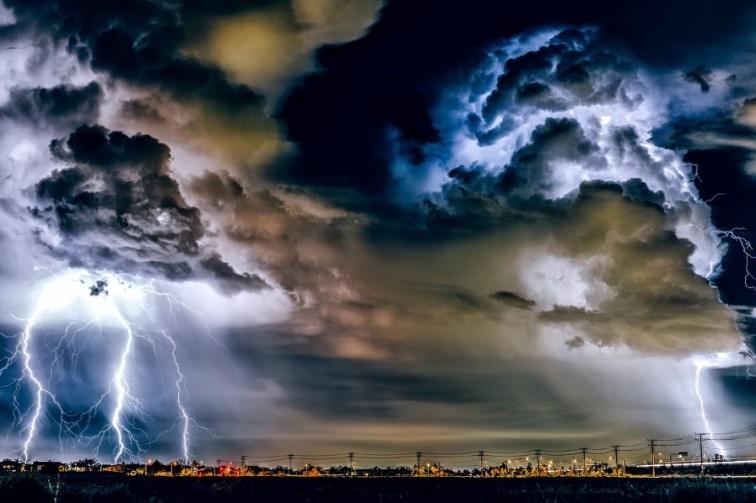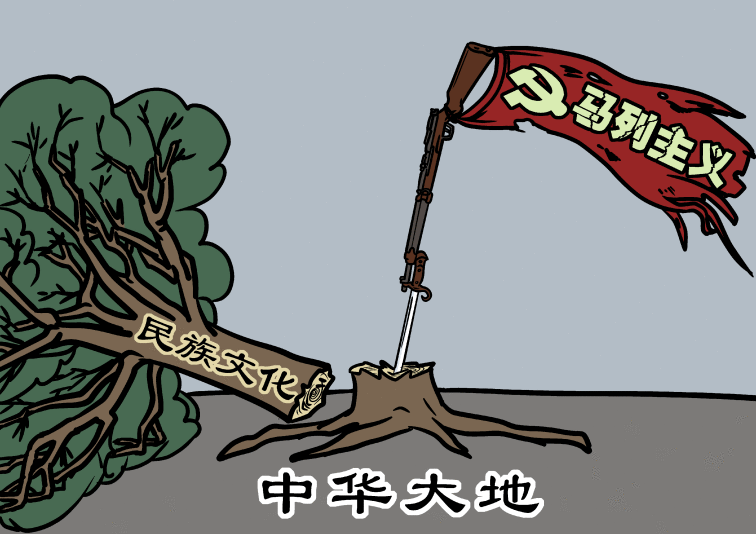Recently, the owner of a textile factory in Sichuan allegedly withheld wages. After repeatedly trying and failing to recover his pay, an employee reportedly set fire to the workshop. The incident has sparked widespread public attention and heated discussion. (Video screenshot / Composite by Dajiyuan)
[People News] On May 22, a massive blaze engulfed Sichuan Jinyu Textile Co., Ltd., located in the Pingshan Economic Development Zone of Sichuan. The fire soared into the sky, billowing thick black smoke. Videos uploaded by netizens show the entire factory consumed in flames—so intense that some described it as “a fire that couldn’t be put out even if you drained an entire river.”
The cause of the fire? A dispute over just 800 yuan (about 110 USD) in unpaid wages.
According to whistleblowers, a 27-year-old male employee named Wen, driven to despair after repeated failed attempts to recover his withheld wages, snapped. He reportedly stabbed a finance staff member with a knife and then set the factory ablaze, declaring: “Whether I live or die doesn’t matter, but I want you (the factory director) dead!”
Local police later confirmed that Wen committed arson and assault, but denied the claim of wage withholding. They stated that Wen had previously exhibited signs of depression and suicidal tendencies, and alleged that after repeated failed attempts to retrieve his pay, he “gave up completely” and lashed out in retaliation. Netizens mocked this official statement as just another “state-sponsored fiction.”
Following the incident, Wen was dubbed “Brother 800” (Baibai Ge) by Chinese internet users and quickly became a trending tag on Chinese social media.
Online commentary was blunt and cutting:
-
“For someone to burn a factory over 800 yuan, imagine how helpless he must’ve felt.”
-
“Hope bosses grow a conscience.”
-
“This is what it means to be Chinese.”
The explosion of “Brother 800” across the internet reminded me of another figure recently enjoying a resurgence in popularity—Huang Chao.
Who was Huang Chao?
He was the infamous leader of a massive peasant rebellion at the end of the Tang Dynasty—a name historically associated with rebellion, chaos, and collapse. Yet now, Huang Chao has begun reappearing across online discourse, transformed into a new symbol of popular rage.
The well-known online commentator Liu Shen Leilei recently wrote in an article: “Have you noticed? The name ‘Huang Chao’ is trending again.”
He notes that in the comment sections of several recent hot-button issues, the same line of poetry keeps popping up:
“The bones of nobles crushed beneath the imperial avenue.” (天街踏盡公卿骨)
Some users even post openly: “When will we finally see the bones of nobles crushed beneath the imperial avenue?”
This verse comes from Ballad of the Qin Woman (《秦婦吟》), a poem from the late Tang era, describing the devastation caused by Huang Chao’s rebellion.
Whether it was the “Dong Miss” (董小姐) controversy, the academic credential scandals involving multiple figures, or the viral case of actress Huang Moumou’s suspected “luxury-priced earrings,” this line has been a recurring refrain in netizen comments.
Even the popular question-and-answer site Zhihu recently featured a trending topic: “What warning does Huang Chao’s renewed popularity signal?”
Liu Shen Leilei reflects: “Not long ago, the most well-known line associated with Huang Chao was still ‘The city is clad in golden armour.’ (滿城盡帶黃金甲)”
Though that line also hints at rebellion, people used to appreciate it from an aesthetic angle, thinking it beautiful, poetic, almost like a cultural tourism slogan.
Now, it has morphed into: “The bones of nobles crushed beneath the imperial avenue.”
The same Huang Chao, once a romantic muse for filmmaker Zhang Yimou, has now become the voice of people’s fury.
Nowadays, even someone too squeamish to gut a loach might join the online chorus reciting that fierce line about smashing elites underfoot.
From the viral rise of “Brother 800” to the resurgence of Huang Chao, these trends reveal a shared reality: China today has become a pressure cooker. The pent-up fury of the masses toward the injustice of CCP rule is like seething steam, ready to blow the lid off at any moment over a seemingly trivial spark.
As Sichuan scholar Tang Gang put it in an interview with Radio Free Asia, Chinese society is entering an unpredictable future. Under mounting economic pressure, social relations are becoming increasingly tense: “From a traditional society where conflict could be resolved or endured, we are shifting to one of unforgiving struggle and antagonism.”
It’s not hard to imagine: as social tensions continue to escalate, China will see more and more “Brother 800” figures. And who’s to say—one of them may eventually become the next Huang Chao.
The water in the pot is already boiling. How much longer can the lid hold?











News magazine bootstrap themes!
I like this themes, fast loading and look profesional
Thank you Carlos!
You're welcome!
Please support me with give positive rating!
Yes Sure!